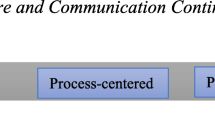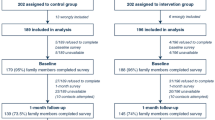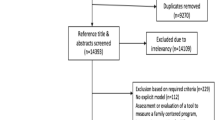Abstract
Studies of end-of-life communication and care have emphasized physician–patient conversations, often to the exclusion of family members’ discussions and interactions with providers, or with patients themselves. Relatively little is known therefore about families’ experiences of end-of-life care in the hospital, or the concrete meanings and practices through which families conceive and define communication. Yet increasingly, family members are asked to serve as surrogates and thereby to participate in the facilitation of decisions for medical procedures and the withdrawal of treatments. It is thus worthwhile to consider their perceptions and involvement in hospitalization at the end of life. This paper offers a descriptive account of families’ assessments of communication at life’s end in the hospital—focusing in particular on their understandings of and conversations about prognosis and its implications. It reflects on the burdens of responsibility and regret posed to families by the ways communication is both conceived and evaded by different players in the hospital setting.
Similar content being viewed by others
References
Aries, P. 1974 Western Attitudes Towards Death: From the Middle Ages to the Present. Baltimore: Johns Hopkins University Press.
1981 The Hour of Our Death. New York: Oxford University Press.
Armstrong, D. 1987 Silence and Truth in Death and Dying. Social Science and Medicine 24(8): 651–657.
Back, A., R. Arnold, and T. Quill 2003 Hope for the Best, and Prepare for the Worst. Annals of Internal Medicine 138(5): 439–444.
Baker, R., A. Wu, J. Teno, B. Kreling, A. Damiano, H. Rubin, M. Roach N. Wenger, R. Phillips, N. Desbiens, A. Connors, W. Knaus, and J. Lynn 2000 Family Satisfaction with End-of-Life Care in Seriously Ill Hospitalized Adults. Journal of the American Geriatrics Society 48: S61–S69.
Cartier, C. 2003 From Home to Hospital and Back Again: Economic Restructuring and the Gendered Problems of Place-Switching Health Services. Social Science and Medicine 56: 2289–2301.
Christakis, N. 1997 The Ellipsis of Prognosis in Modern Medical Thought. Social Science and Medicine 44(3): 301–315.
1999 Death Foretold: Prophecy and Prognosis in Medical Care. Chicago: University of Chicago Press.
Donnelly, W. 1996 Letter to the Editor: The SUPPORT Project and Improving Care for Seriously Ill Patients. Journal of the American Medical Association 275(16): 1228.
Drought, T., and B. Koenig 2002 “Choice” in End-of-Life Decision Making: Researching Fact or Fiction? The Gerontologist 42(Special Issue III): 114–128.
Elias, N. 1985 The Loneliness of the Dying. New York: Basil Blackwell.
Feinberg, A. 1997 Editorial: The Care of Dying Patients. Annals of Internal Medicine 126(2): 164–165.
Glaser, B., and A. Strauss 1965 Awareness of Dying. Chicago: Aldine.
Good, M., B. Good, and M. Fischer 1988 Introduction: Discourse and the Study of Emotion, Illness and Healing. Culture, Medicine, and Psychiatry 12: 1–7.
Good, M., B. Good, C. Schaffer, and S. Lind 1990 American Oncology and the Discourse on Hope. Culture, Medicine, and Psychiatry 14: 59–79.
Gordon, D. 1994 The Ethics of Ambiguity and Concealment around Cancer. In Interpretive Phenomenology: Embodiment, Caring, and Ethics in Health and Illness. P. Benner, ed., London: Sage.
Gordon, D., and E. Paci 1997 Disclosure Practices and Cultural Narratives: Understanding Concealment and Silence around Cancer in Tuscany, Italy. Social Science and Medicine 44(10): 1433–1452.
Guyatt, G., A. Mitchell, D. Mollow, R. Capretta, J. Horsman, and L. Griffith 1995 Measuring Patient and Relative Satisfaction with Level or Aggressiveness of Care and Involvement in Care Decisions in the Context of Life Threatening Illness. Journal of Clinical Epidemiology 48(10): 1215–1224.
Hanson, L., M. Danis, and J. Garrett 1997 What is Wrong with End-of-Life Care? Opinions of Bereaved Family Members. Journal of the American Geriatric Society 45: 1339–1344.
Johnson, N., D. Cook, M. Giacomini, and D. Willms 2000 Towards a “Good” Death: End-of-Life Narratives Constructed in an Intensive Care Unit. Culture, Medicine and Psychiatry 24: 275–295.
Katz, J. 1984 The Silent World of Doctor and Patient. New York: Macmillan.
Kaufman, S. 1998 Intensive Care, Old Age, and the Problem of Death in America. The Gerontologist 38: 715–725.
Kubler-Ross, E. 1969 On Death and Dying. New York: Macmillan.
Lamont, E., and N. Christakis 2001 Prognostic Disclosure to Patients with Cancer near the End of Life. Annals of Internal Medicine 134(12): 1096–1105.
Lynn, J., J. Teno R. Phillips, A. Wu, N. Desbiens, J. Harrold, M. Claessens, N. Wenger, B. Kreling, and A. Connors for the SUPPORT Investigators 1997 Perceptions by Family Members of the Dying Experience of Older and Seriously Ill Patients. Annals of Internal Medicine 126(2): 97–106.
McManners, J. 1981 Death and the Enlightenment. New York: Oxford University Press.
Solomon, M. 1993 How Physicians Talk about Futility: Making Words Mean Too Many Things. Journal of Law, Medicine, and Ethics 21(2): 231–237.
Steinhauser, K., E. Clipp, M. McNeilly, N. Christakis, L. McIntyre, and J. Tulsky 2000 In Search of a Good Death: Observations of Patients, Families, and Providers. Annals of Internal Medicine 132(10): 825–832.
Stoddard, S. 1978 The Hospice Movement: A Better Way of Caring for the Dying. New York: Vintage Books.
SUPPORT Investigators. 1995 A Controlled Trial to Improve Care for Seriously Ill Hospitalized Patients. Journal of the American Medical Association (November 22/29) 274(20): 1591–1598.
Taylor, K. 1988 Physicians and the Disclosure of Undesirable Information. In Biomedicine Examined. M. Lock and D. Gordon, eds., Dordrecht: Kluwer Academic.
The, A., T. Hak, G. Koeter, and van der G. Wal 2000 Collusion in Doctor–Patient Communication about Imminent Death: An Ethnographic Study. British Medical Journal 321: 1376–1381.
Wolfe, J., N. Klar E. Holcombe, J. Duncan, S. Salem-Schatz, E. Emanuel, and J. Weeks 2000 Understanding of Prognosis among Parents of Children Who Died of Cancer. Journal of the American Medical Association 284(19): 2469–2475.
Author information
Authors and Affiliations
Corresponding author
Rights and permissions
About this article
Cite this article
Russ, A.J., Kaufman, S.R. Family Perceptions of Prognosis, Silence, and the “Suddenness” of Death. Cult Med Psychiatry 29, 103–123 (2005). https://doi.org/10.1007/s11013-005-4625-6
Issue Date:
DOI: https://doi.org/10.1007/s11013-005-4625-6




